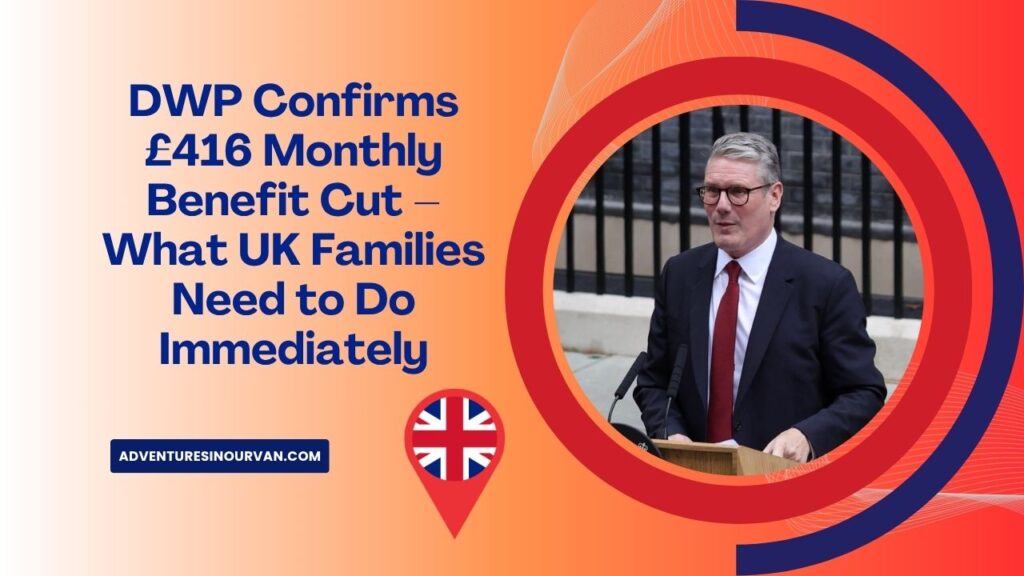In a shocking development, the Department for Work and Pensions (DWP) has confirmed a monthly benefits cut of up to £416, sending alarm bells across the UK. This cut directly affects low-income families, carers, and those with disabilities—especially households relying on multiple Universal Credit top-ups and disability entitlements. With rising living costs, this decision could worsen financial hardship for thousands already living on tight budgets.
Let’s break down who’s affected, why this is happening, and what steps you must take immediately to minimize the damage.
Why the £416 Benefit Cut Is Happening Now
According to the DWP, the £416 cut is part of a cost-saving strategy designed to:
- Control inflation
- Prevent benefit overpayments
- Streamline the welfare system
However, critics argue that these justifications overlook the real-world impact on families still recovering from COVID-era financial instability, soaring energy bills, and high food prices.
While the DWP claims other support will offset the loss—such as Child Benefit increases or energy discounts—advocacy groups argue they don’t replace the predictability and consistency of the monthly £416 payment.
Who Will Be Affected by the Cut?
The DWP’s reduction will mostly impact:
- Families receiving multiple benefits
- Carers and individuals with long-term health conditions
- Low-income households dependent on Universal Credit
- Families with children or dependents
The timing couldn’t be worse. With inflation still affecting essentials like rent and groceries, this cut could force families to reassess their entire household budget.
Immediate Steps Families Must Take
If you rely on benefits, you need to act quickly. Here’s what you should do:
1. Check Your Universal Credit Journal
- Log in to your Universal Credit online account
- Review your next payment summary
- If your payment is lower than expected, note the difference and reason
2. Contact the DWP or Jobcentre
- Call the Universal Credit helpline or visit your local Jobcentre
- Ask for clarity on the payment reduction
3. Seek Local Emergency Support
- Apply for Discretionary Housing Payments
- Request emergency vouchers for food or utilities from your council
- Use food banks or local support charities
4. Get Help from UK Charities
- Turn2Us
- Citizens Advice
- StepChange
These organizations offer financial guidance, help with appeals, and even emergency grants.
Alternative Support Options Still Available
Despite the cut, there are other government and charitable resources that could help bridge the gap:
| Support Type | Details |
|---|---|
| Cost of Living Payments | Issued separately from Universal Credit; check eligibility and schedule |
| Council Tax Reduction Scheme | Reduces monthly council tax bills for low-income families |
| Free School Meals & Uniform Grants | Available through local councils for eligible children |
| Warm Home Discount | Energy bill support during winter months |
| Charity Grants | Local and national organizations offer one-off payments or food support |
Apply early and track your applications to avoid delays.
How to Appeal If You Think It’s a Mistake
Yes, you can appeal the decision—but only under specific circumstances. If you suspect an error or miscalculation:
- Request a Mandatory Reconsideration through your Universal Credit account
- Submit supporting documents (e.g., medical records, tenancy agreements, etc.)
- If denied, proceed to a benefits tribunal
Act fast—the appeal process has strict timelines.
How Will This Cut Impact the Wider UK Economy?
Experts warn that slashing £416 per month from vulnerable families will:
- Reduce consumer spending
- Cause school absenteeism due to unaffordable supplies
- Increase mental health issues due to financial pressure
Communities in urban high-deprivation areas and rural low-access regions will likely face the most severe consequences.
Government’s Response to Public Criticism
The DWP insists this is a “necessary adjustment”, claiming that inflation control and system balance are priorities. Officials point to temporary energy support, one-off payments, and expanded benefit access as counterweights.
But advocacy groups argue these alternatives are not sufficient, especially when families have built their budgets around stable monthly payments that are now disappearing.
The £416 monthly benefit cut may feel overwhelming, but early action can help protect your family from the worst effects. Check your payments, apply for alternative aid, and know your rights—especially if your situation was incorrectly assessed.
This is a reminder that the welfare system can shift rapidly, and those who adapt fastest fare the best. If you or someone you know is affected, don’t wait—take action now, and reach out to the right resources to safeguard your financial stability in these uncertain times.
FAQs
Can I still receive other benefits after the £416 cut?
Yes, other entitlements such as Child Benefit, Housing Support, or one-off grants may still apply. Check with DWP or Citizens Advice.
How do I appeal the benefit cut?
Start by requesting a Mandatory Reconsideration online or by phone. You’ll need to provide evidence to support your claim.
Is this cut permanent?
The DWP hasn’t clarified. Historically, such cuts rarely get reversed, so it’s best to plan as if it’s long-term.

